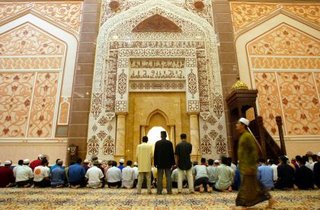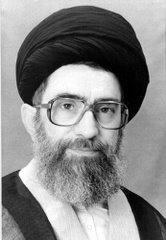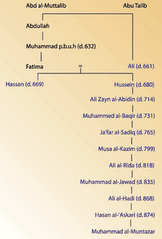
The lies, innovations & conjectures behind Tarawih
Praying 'Nawafil Salah' is a very virtuous act in Islam (especially during Ramadhan).
But 'Tarawih' (which is 8 or 20 Rakah Salat after Isha عشاء Prayer and is offered by Ahle Sunnah brothers as well as Nasibies/Wahabies) does not fall into the category of this virtuous act due to the Evils and Innovations attached to it.
We will stay short, but still very comprehensive. Insha-Allah.
1st Evil Innovation: A lie upon Rasool (saww) that Tarawih was his Sunnah
It is a lie upon Rasool (saw) that Tarawih was his Sunnah. It is falsely claimed that:
Rasool (saw) offered Tarawih for 3 Nights.
But then he stopped while he feared that Tarawih might become obligatory upon Ummah.
Answer: Rasool offered Tahajjud during those 3 nights and not Tarawih
Please note:
Tarawih is 20 or 8 Rakah prayer after Isha عشاء Prayer
But Rasool (saww) not even a Single time in his life offered any such 20 or 8 Rakah Salah after Isha عشاء prayer.
What Rasool (saww) offered for 3 nights, was only and only TAHAJJUD Prayer (which starts after Midnight).
For proof, see the following hadith, where it is particularly mentioned that Rasool (saww) came for prayer only after the “Middle of Night”.
Narrated 'Urwa:
That he was informed by 'Aisha, "Allah's Apostle went out in the MIDDLE OF NIGHT(i.e. For Tahajjud) and prayed in the mosque and some men prayed behind him. In the morning, the people spoke about it and then a large number of them gathered and prayed behind him (on the second night). In the next morning the people again talked about it and on the third night the mosque was full with a large number of people. Allah's Apostle came out and the people prayed behind him. On the fourth night the Mosque was overwhelmed with people and could not accommodate them, but the Prophet came out (only) for the Morning Prayer.
Sahih Bukhari, Volume 3, Book 32, Number 229
Therefore, people must stop lying upon Rasool (saw) that he prayed such 8 or 20 Rakah Salah after Isha Prayer and thus it is his Sunnah.

1st challenge
Those who claim such absurdities may prove to us that the present day Tarawih (i.e. Praying 8 or 20 Rakah Salat after Isha Prayer) was ever practiced by Rasool Allah (saww).
Note: Some blind ignorant people (including Mufties of Saudia) have nowadays started claiming that “Qiyamul Lail قیام الیل “(i.e. Tahajjud) and Tarawih after Isha Prayer are the same thing. We will deal with this later on. Insha-Allah.
2nd Evil Innovation: Praying Tarawih in Congregation (Jama’ah) in Mosque
Ahle Sunnah brothers (as well as Nasibies/Wahabies) claim that Rasool (saww) stopped the so called Tarawih Prayer (First) in Congregation and (Second) in Mosque, while he feared it to become obligatory upon Ummah. And while Rasool (saw) already passed away, therefore it can no more become compulsory for Ummah.
Answer: Offering Nawafil at home is Sunnat-e-Muwakkidah
Again, this is half Truth and half Lie. The defenders of Tarawih are concentrating on “Non-Related” part of speech of Rasool (saw), while completely neglecting the “Related One” and most important part of his Saying.
Here is the complete speech of Rasool (saw):
Narrated Zaid bin Thabit:
Allah's Apostle made a small room (with a palm leaf mat). Allah's Apostle came out (of his house) and prayed in it. Some men came and joined him in his prayer. Then again the next night they came for the prayer, but Allah's Apostle delayed and did not come out to them. So they raised their voices and knocked the door with small stones (to draw his attention). He came out to them in a state of ANGER, saying, "You are still insisting (on your deed, i.e. Tarawih prayer in the mosque) that I thought that this prayer (Tarawih) might become obligatory on you. So you people, offer this prayer (i.e. Tahajjud or the so called Tarawih) at your homes, for the best prayer of a person is the one which he offers at home, except the compulsory (congregational) prayer."
Sahih Bukhari, Volume 8, Book 73, Number 134
Thus Rasool (saw) particularly/specifically referred to this Tahajjud (or the so called Tarawih) Prayer, and told:
Offer this Tahajjud (or so called Tarawih) prayer at your homes.
And at homes too, pray them individually (i.e. don’t start making Jamah (i.e. Congregation) at homes.
Offering these Nawafil individually at homes is better than Mosque till Qiyammah (and is irrelative of Rasool (saww) being alive or dead)
Therefore, it is Sunnat-e-Muwakkidah (i.e. Very Strongly Recommended) to pray Nawafil at homes, while praying this so called Tarawih is directly against this Strong Recommendation of Rasool (saw).
Side Comment: It is not allowed to pray Nawafil in Congregation (Jammah)
In the Sharia of Islam, it is not allowed to pray any kind of Nawafil in Congregation.
The Defenders of Tarawih deny it and object why then Rasool (saw) offered the Nawafil of Tahajjud (which is also known as Qiyam-ul-Lail) in congregation for the 3 nights?
The answer is, Rasool (saw) didn't offer any non-compulsory Nafl prayer during those 3 nights, but it was a compulsory prayer which he offered, and only due to this he allowed people to join behind him in congregation.
Qiyyam-ul-Lail was made compulsory Only for Rasool (saw) by Allah (swt). Allah says in Quran:
وَمِنَ اللَّيْلِ فَتَهَجَّدْ بِهِ نَافِلَةً لَّكَ عَسَى أَن يَبْعَثَكَ رَبُّكَ مَقَامًا مَّحْمُودًا
[Shakir 17:79] And during a part of the night, pray Tahajjud beyond what is incumbent on you; maybe your Lord will raise you to a position of great glory.
Therefore, Rasool (saw) was only offering the Compulsory Prayer with Niyyah of “Fardh” فرض , and when people joined behind him, they only followed the Niyyah of Imam.
Hence, it is wrong to say that Rasool (saw) made the Jamma’ah for any Nafl Prayer during his whole life.
2nd challenge
Rasool (saww) specifically and particularly wanted (and strongly recommended) about this Tahajjud (or so called Tarawih) prayer to be offered at homes.
Prove us that:
This strong Recommendation of Rasool (saww) is abrogated after his death.
Praying it in congregation (and that too in mosques) is better than praying it individually at homes.
3rd Evil of Tarawih: It has ended one Highly Recommended Sunnah of Rasool (saw) (i.e. Sunnat-e-Muwakkidah)
Yes, Tarawih is done against the Strong Recommendation of Rasool (saw) of praying Nawfil at homes till Qiyyammah.
According to sayings of Rasool (saw), one sign of Biddah (Evil Misguided Innovation) is this that people stop acting upon one similar Sunnah of Rasool. Therefore Prophet (saw) said:
When one nation innovates some thing, then one Sunnah of same kind is disappeared.
Mishkaat, page 31, Urdu Edition
3rd Challenge
This is an ample proof of Tarawih to be among one of Evil Misguided Innovations, otherwise it is a challenge to prove otherwise.
4th Evil: Tarawih vs “Sahaba Worship”
Yes, present form of Tarawih has nothing to do with Sunnah of Rasool (saw), and it is based only and only upon the disease of “Sahaba Worship” and is done only for this reason that Umar Ibn Khattab introduced it (against the Recommendation of Rasool (saw)).
Narrated Abu Huraira:
Ibn Shihab (a sub-narrator) said, "Allah's Apostle died and the people continued observing that (i.e. Nawafil offered individually, not in congregation), and it remained as it was during the Caliphate of Abu Bakr and in the early days of 'Umar's Caliphate." 'Abdur Rahman bin 'Abdul Qari said, "I went out in the company of 'Umar bin Al-Khattab one night in Ramadan to the mosque and found the people praying in different groups. A man praying alone or a man praying with a little group behind him. So, 'Umar said, 'in my opinion I would better collect these (people) under the leadership of one Qari (Reciter) (i.e. let them pray in congregation!)'. So, he made up his mind to congregate them behind Ubai bin Ka'b. Then on another night I went again in his company and the people were praying behind their reciter. On that, 'Umar remarked, 'what an excellent Bid'a (i.e. innovation in religion) this is; but the prayer which they do not perform, but sleep at its time is better than the one they are offering.' He meant the prayer in the last part of the night(Tahajjut).
Sahih Bukhari, Volume 3, Book 32, Number 227
Mawlana Waheeduz Zaman (A famous Sunni Scholar in Indian-Subcontinent who wrote commentry of Bukhari) writes after this hadith:
"From this words of Hadhrat Umar (i.e. what a good Innovation), it becomes clear that he he himself not joined that prayer. Perhaps Hadhrat Umar thought that Nafl prayers are better at home and at the last part of night. Muhammad bin Nasr Marozy محمد بن نصر مروزی narrated that Ibn Abbas said that he was with Hadhrat Umar that people started making noises. Upon this Hadhrat Umar inquired what was that. Others told him that people are going back after offering Tarawih. Hearing this, Hadhrt Umar said: "The night that has been left, is better that what has passed away".
Note: Ahle Sunnah brothers (as well as Nasibies/Wahabies) claim that:
It is allowed to pray Nawafil in Congregation in Mosque (as Sahaba were praying in small groups in congregation in above mentioned hadith)
Therefore, Hadhrat Umar didn't start an entirely new Innovation, but his action was based upon the prior actions of those Sahaba, who were praying Nawafil in Small groups of congregation in the mosque.
And our reply is:
Indeed Umar Bin Khattab was not the first person who initiated this Bidah. But the first ones, who innovated, were those Sahaba, who started praying in small groups against the clear and strong Recommendation of Rasool (saw) to offer Nawafil at homes individually.
It is sickness of mind to legalize the Biddah of Umar Ibn Khattab, while it is based on previous Innovation of some other Sahaba.
As Caliph, it was obligatory upon Umar Ibn Khattab to stop those people (who were praying even in small groups in congregation) from this Biddah. But instead of this, he fully supported this Biddah and publicized it.
Earlier many people followed the Sunnah of Rasool (saw) and indeed prayed individually, but after the support of Umar Ibn Khattab for this Biddah, the real Sunnah of Rasool (saw) totally disappeared from the society.

5th Evil of Tarawih: It has stopped many people from praying the Real Tahajjud Prayer
Once again look at this part of above mentioned hadith:
...On that, 'Umar remarked, 'what an excellent Bid'a (i.e. innovation in religion) this is; but the prayer which they do not perform, but sleep at its time is better than the one they are offering.' He meant the prayer in the last part of the night(Tahajjud).
Sahih Bukhari, Volume 3, Book 32, Number 227
Now the real Sunnat-e-Muwakkidah (highly Recommended Sunnah) is to pray Tahajjud, but people (out of their disease of Umar Worship... in name of “Seerat-e-Sheikhain) preferred this Evil Misguided Innovation of Tarawih upon the Tahajjud Prayer.
You can see it for yourself that people are running for “Tarawih Prayers” (as if their fast doesn't complete without this), but keep on sleeping at times of Tahajjud.
And sole reason behind this is nothing more than the disease of “Sahaba Worship”.
6th Evil of Tarawih: The Misguided Innovated Fatwas of 4 Fiqhs of Ahle Sunnah about Congregation of Tarawih.
As proved earlier, Rasool (saw) never prayed any 8 or 20 Rakah prayer after Isha Prayers (neither individually, nor in congregation).
Now let us look upon edicts of 4 Aima of Ahle Sunnah upon the Congregation of Tarawih.
Hanafi Fiqh
Al-Durre Mukhtar, vol 1, page 659:
Offering Tarawih (in Jammah) is unanimously (Ijma) Sunnat-e-Mua'akida and it is not allowed to neglect it.
Fatawa Alamgiri, vol 1, page 116:
It is Sunnat-e-Kiffaya to offer the Tarawih Prayer in Congregation (Jammah). If all the people of Masjid and community don't offer it then all of them are Sinners.
Note: People didn't offer Tarawih during times of Rasool (saw) and Hadhrat Abu Bakr... Are those people also Sinners?
Fatawa Alamgiri, vol 1, page 116:
If people have offered Tarawih, then they want to offer it the 2nd time then they are not allowed to do it in congregation.
Note: Can the terrorists of Sipah Sahaba tell us if it was Rasool Allah (saww), who declared it Haram to offer Tarawih 2nd time in congregation? And if it was not Rasool (saww), then who is that person who is making things Haram in Islamic Sharia?
Al-Durre Mukhtar, vol 1, page 662:
It is Sunnat-e-Mua'akida to complete the Quran once in Tarawih. Completing it twice has "Fadhilah" (better) and completing it thrice is "Afdhal" (best). This Sunnah should not be neglected due to the laziness of people.
Note: Rasool Allah (saww) never completed any Quran (once or twice or thrice) during any 8/20 Rakah prayer after Isha, then how has this staircase of virtues developed?
Shafai & Hambali Fiq'hs
They declare the Jama'at an obligatory Sunnah for all i.e. leaving without any reason is a sin.
Our Comments: No comments from our side. But comments by Sunni Brothers are to be welcomed.
Maliki Fiq'h
They consider the Jama'at as Mustahab i.e. better, but not an obligatory Sunnah.
Our Comments:
This is again a bidah i.e. Prophetic Instructions were that it is Mustahab to offer Tahajjud at home. And if still people want to go against the Prophet Instruction and want to declare it Mustahab in Jammah, then it's their own fate.
Some more Challenges about Tarawih (only for Wahabi/Nasibies i.e. Not for Ahle Sunnah brothers)
Following Challenges are only for Wahabies/Salafies who have different definition of Biddah from us (Shias) and our Ahle Sunnah brothers.
The definition of Biddah according to Salafies is that any new action, which was not been revealed by Allah (swt), and was later invented by people themselves, comes under category of misguided innovation.
Therefore, we invite them to accept the following Challenges.
4th Challenge: How come Wahabies pray Tarawih for 30 Nights of Ramadhan in congregation?
Rasool (saw) offered Tahajjud (or so called Tarawih) in Congregation for only and only 3 Nights of Ramadhan. How come you extended this Sunnah of 3 nights to whole 30 nights of Ramadhan?
Moreover, tell us the reason why have you extended it only to 30 nights of Ramadhan, and why not you to 365 days of whole year? (i.e. Did Rasool (saw) ever tell you that this Congregational Tarawih prayer is allowed only in Ramadhan and Haram in remaining months?)
Note: This extension to 30 days has nothing to do with Rasool (saw), but Umar Ibn Khattab did it according to his “Qiyyas”, and Salafies are only following this “Qiyyas” today.
5th Challenge: Salafi Sunnah of Completing Whole Qur'an during "Tarawih"
Another very important question for Salafies(Wahabies), which they never answer.
Please show us that:
Rasool (saww) ever completed whole Quran in this form of Congregational Prayer during 30 nights of Ramadhan.
If not, then prove to us that Rasool (saww) ever ordered us to do so (in congregational form) after his death.
These Salafies are the same people who cry out loudly that we (Shia) have made it a regular practice (i.e. Biddah) to say Darood before Adhan. But when they themselves made a regular practice of completing Quran during Congregational Tarawih, then it is fine. Double Standards?
Note: Neither Allah, nor Rasool (saww) ever ordered (or recommended) to recite whole Quran during Congregational prayers during 30 nights of Ramadhan. Contrary to this, Allah (swt) recommended to read so much Quran as it is easy.
[Shakir 73:20] Surely your Lord knows that you pass in prayer nearly two-thirds of the night, and (sometimes) half of it, and (sometimes) a third of it, and (also) a party of those with you; and Allah measures the night and the day. He knows that you are not able to do it, so He has turned to you (mercifully),therefore read what is easy of the Quran. He knows that there must be among you sick, and others who travel in the land seeking of the bounty of Allah, and others who fight in Allah's way, therefore read as much of it as is easy (to you),
Therefore, completing one Quran during 30 nights of Ramadhan is only and only a Bidah of Umar Ibn Khattab, and Salafies are following him in his innovation, instead of following Quran and Sunnah.
6th Challenge: Shabina Vs. Tarawih
Shabina is the practice of Barailvi Ahle Sunnah brothers in Pakistan and India. They complete whole Quran once again during the last 3 nights of Ramadhan.
Now Salafies deem Shabina to be Biddah while according to them it was not done so by Rasool (saw) in the last 3 nights of Ramadhan.
But Salafies have to look that completing One Quran during 30 nights of Ramadhan was also not done by Rasool (saw). Therefore, if you declare Shabina to be an Innovation, then surely Tarawih also becomes an Innovation automatically.
7th Evil of Tarawih: Claiming there is no Difference between Tarawih and Tahajjud and both have same Rewards
Following are the differences between Tahajjud and present day Tarawih.
1. Tahajjud was Compulsory upon Rasool (saw)
Tahajjud prayer was Compulsory upon Rasool (saw). As compared to this, Rasool (saw) never offered any such 8 or 20 Rakah Salah in Congregation, as it has been done in Tarawih.
2. Tahajjud is Sunnat-e-Muwakkidah upon Ummah, while Tarawih is not
Tahajjud was always Sunnat-e-Muwakkidah upon Ummah.
As compared to this, Tarawih (i.e. 8 or 20 Rakah Salat after Isha prayers) is at maximum simple “Nafl” prayer (if prayed individually at homes). Tarawih has absolutely no preference over the any other Nafl prayer which is offered throughout a day at any time
(In fact, praying Tarawih in congregation in mosques makes it inferior to any other Nafl Prayer which is offered individually at homes)
3. Tahajjud Time starts only after Middle of Night (i.e. praying any Nafl after Isha doesn't count in Tahajjud)
بِسْمِ اللهِ الرَّحْمنِ الرَّحِيمِ
يَا أَيُّهَا الْمُزَّمِّلُ
قُمِ اللَّيْلَ إِلَّا قَلِيلًا
نِصْفَهُ أَوِ انقُصْ مِنْهُ قَلِيلًا
أَوْ زِدْ عَلَيْهِ وَرَتِّلِ الْقُرْآنَ تَرْتِيلًا
[Shakir 73:1] O you who have wrapped up in your garments!
[Shakir 73:2] Rise to pray in the night except a little,
[Shakir 73:3] Half of it, or lessen it a little,
[Shakir 73:4] Or add to it, and recite the Quran as it ought to be recited.
Similarly, see the verse 20 of Surah Muzamil below:
إِنَّ رَبَّكَ يَعْلَمُ أَنَّكَ تَقُومُ أَدْنَى مِن ثُلُثَيِ اللَّيْلِ وَنِصْفَهُ وَثُلُثَهُ وَطَائِفَةٌ مِّنَ الَّذِينَ مَعَكَ وَاللَّهُ يُقَدِّرُ اللَّيْلَ وَالنَّهَارَ عَلِمَ
[Shakir 73:20] Surely your Lord knows that you pass in prayer nearly two-thirds of the night, and (sometimes) half of it, and (sometimes) a third of it, and (also) a party of those with you; and Allah measures the night and the day.
Therefore, if still some one insists that praying 8 or 20 Rakah Salat after Isha prayer will have the rewards of Tahajjud, then that person is blind (physically as well as spiritually).
4. Even Umar Ibn Khattab differentiated between Tarawih and Tahajjud
It was Umar Ibn Khattab who started the Biddah of Tarawih. But he himself knew very well the difference between Tarawih and Tahajjud Prayers. In his own words:
Narrated Abu Huraira:
Ibn Shihab (a sub-narrator) said, "Allah's Apostle died and the people continued observing that (i.e. Nawafil offered individually, not in congregation), and it remained as it was during the Caliphate of Abu Bakr and in the early days of 'Umar's Caliphate." 'Abdur Rahman bin 'Abdul Qari said, "I went out in the company of 'Umar bin Al-Khattab one night in Ramadan to the mosque and found the people praying in different groups. A man praying alone or a man praying with a little group behind him. So, 'Umar said, 'in my opinion I would better collect these (people) under the leadership of one Qari (Reciter) (i.e. let them pray in congregation!)'. So, he made up his mind to congregate them behind Ubai bin Ka'b. Then on another night I went again in his company and the people were praying behind their reciter. On that, 'Umar remarked, 'what an excellent Bid'a (i.e. innovation in religion) this is; but the prayer which they do not perform, but sleep at its time is better than the one they are offering.' He meant the prayer in the last part of the night(Tahajjut).
Sahih Bukhari, Volume 3, Book 32, Number 227
Do the Salafies/Wahabies still have courage to claim there is no difference between Tarawih and Tahajjud and they have same Rewards?
Umar Ibn Khattab prayed 20 Rakah during Tarawih while Rasool (saw) offered 8 Rakah in Tahajjud
One of the biggest difference between Tahajjud and Tarawih is the fact that established Sunnah of Rasool (saw) was to offer 8 Rakah during Tahajjud. While when Umar Ibn Khattab initiated Tarawih, he odered people to offer 20 Rakah Salah.
This also proofs when Umar Ibn Khattab started Tarawih, he had not in mind to revive that Sunnah of Rasool (saw) when he offered Tahajjud for 3 nights in mosque in congregation.
We have dealt with this dispute of 8 and 20 Rakah in detail in 3rd Chapter
8th Evil of Tarawih: Reading Quran at a fast pace instead of reciting meaningfully and listening attentively
Should the Holy Qur'an be recited at a fast pace to cover more than one Para every night in Tarawih Prayer?
The Qur-an says that it should be recited meaningfully and listened to it attentively
[Yusufali 7:204] When the Qur'an is read, listen to it with attention, and hold your peace: that ye may receive Mercy.
Similarly:
لَا تُحَرِّكْ بِهِ لِسَانَكَ لِتَعْجَلَ بِهِ
[Shakir 75:16] Do not move your tongue with it to make haste with it,
Does completing whole Quran during these congregational prayers of Tarawih reflect these teachings of the Qur-an, or make the recitation meaningful? The method of recitation of Qur’an in tarawih is a clear opposition to the teaching of Quran, and a disgrace to it.











No comments:
Post a Comment